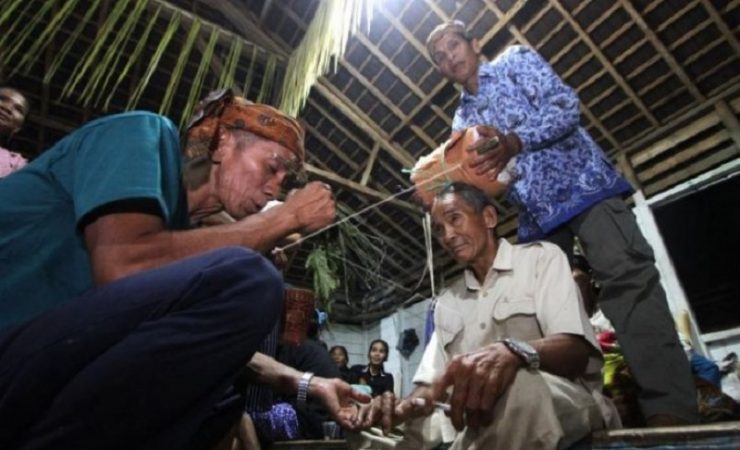TWO “balian” or shamans of Dayak Meratus tribe circled a tree-like ornament, bare feet shuffling on floorboards under dim bulbs accompanied by minimalist rhythms of single drums and gandrang, metallic bracelets jingling to their chants.
As if hypnotized, dozens of men and women followed the shamans’ dance circling the multilevel ornament called Langgatan, one main ornament made of palm leaves in Aruh Bawanang ritual. One by one they joined the dancing group, like a flashmob, except that they did not disperse when the music stopped.
This was just the beginning of the ritual performed in Balai Kiyu, located deep in the hilly forest at the foot of the Meratus Mountains as one of the traditional communities in Hinas Kiri Village, Batang Alai Subdistrict, South Kalimantan’s district of Hulu Sungai Tengah.
Once the dancing stopped, chief of the balians, Sihat murmured his mantra while providing “tepung tawar” to several balians, before they sat around the Langgatan. Then Sihat, started to lead the “batandik”, the core of the ritual where he recited the mantra all night long followed by other balians.
Aruh Bawanang is a thanksgiving ritual of Dayak Meratus tribe who inhabit the Meratus Mountains in South Kalimantan. It is one of the tribe’s many rituals to express gratitude to their God for a good paddy crop yield.
“Through this Aruh Bawanang we thank God for this good yield. We also pray for our health, wealth, and fortune,” said chief of Balai Kiyu traditional community Makorban, who is also a balian himself.
He made an analogue of the debt payment. “After the God of the universe gives us this fortune, we pay it back with this ritual.”
For the Dayak Meratus tribe, the land and forest are their lifelines, hence Mother Nature must be respected. Before the planting season begins, the Dayaks perform the Aruh Bamula ritual to seek Mother Nature’s approval. Other rituals are performed at each stage of the paddy cultivation, as they believe that paddy is a fruit from the tree of heaven.
Aruh Bawanang is held for six days and six nights. “No more no less, as this was the mandate from our ancestors. We strongly believe this, and have to perform (the ritual) when we have good yields,” Makorban said.
They cannot perform the ritual every year. This happens only when they have a good crop and if agreed upon by all members of the community.
Families who have vowed to hold the ritual will provide “piduduk” or offerings for the spirits of their ancestors. The offerings consist of rice, coconut, palm sugar, and other necessities put in a basket and placed at the base of the Langgatan. They also put “gilingan” – tobacco, gambier, and lime, wrapped in betel leaves – as a medium to call the spirits to accept their offerings.
Rice for all
Despite the good crop yield, the Dayak Meratus tribe is firm about not selling the rice. The rice is not allowed to be sold in exchange for money, Syahdi, a Dayak who works in the district’s capital city of Barabai said.
“After the harvest, farmers will take a certain amount of the rice, enough to fulfill their needs for a year, as they will only start another planting season after a year,” he said.
The remaining rice will be stored and donated for rituals, neighbors’ wedding parties, or other community needs, Syahdi added.
Most of the Dayaks in Balai Kiyu are rubber farmers in the customary forest. To earn their living, they sell rubber, resin, rattan, bamboo, honey and other forest products.
As in the Aruh Bawanang ritual, the Dayaks as the host will provide 2 to 5 kilograms of rice or lamang – rice and sticky rice cooked in bamboo – for guests from outside the village before they leave after the rituals are complete.
According to the Dayak Meratus rule, guests can only leave the village once the ritual is complete, usually by dawn. Some Dayaks will invite the guests to their homes to stay the night.
However, this rule is not strictly implemented. “You can go home anytime you want, without paying any fine. We are more tolerant about this,” a balian Soleman chuckled.
However, a customary penalty will be strictly imposed for those who create a disturbance during the ritual. Those violating the rule will have to pay a fine measured in “tahil”. Each tahil is worth Rp1.2 million.
As dawn breaks, the chief balian ends the first day of the ritual even as most villagers fall asleep in the Balai. There are another five days with the same sequence of rituals but with different mantras before it all concludes. [antaranews]
















